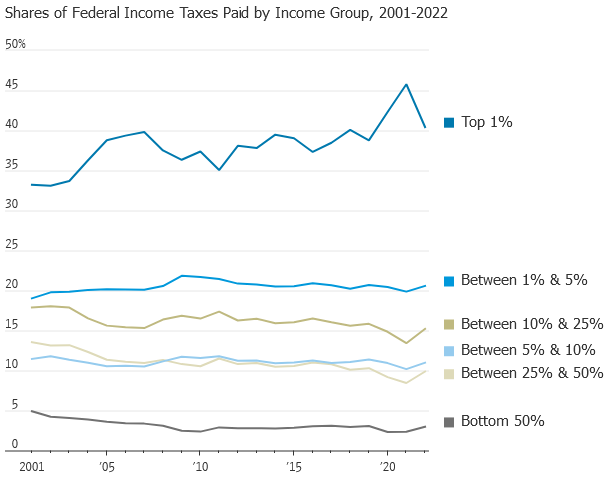Once again, I challenge all those Progressive-Democratic Party politicians, including but not limited to (in no particular order), Senator Elizabeth Warren (MA); soon-to-be-ex-Senate Majority Leader Chuck Schumer (NY); former Senator (DE), Vice President, and soon-to-be-former President Joe Biden; former Senator (CA) and soon-to-be-former Vice President Kamala Harris (D); Senator Martin Heinrich (NM); and Congresswoman Melanie Stansbury (NM) to identify, specifically, what is the fair share of income taxes that the rich should pay—hard dollar amount, or tax rate, or percent of income, or…. Cynically, all they’re willing to say is their feelz: pay up and pay more; it’s not “fair,” otherwise.
Here, though, in concrete terms, is the situation with that especially evil bunch of Americans, those in the top 1% of income-tax filers:
- 22.4% of the country’s total reported earnings
- share of income taxes paid 40.4%
- average federal tax rate of 26.1%
Here is what the smaller people pay in the way of income taxes:
- • bottom 10%: no taxes
- second income decile: -4.8%–yes, negative, due to all the refundable tax credits they get
- third income decile: 2.8%
Back to the top:
- top decile—which includes those 1%-ers: 27%
- especially evil top 0.1% earners: 33.5%
This graph shows the trend from 2001 to 2022:
Of course, those Party politicians know all of this; they being so much smarter than us poor, ignorant average Americans, and all. It’s a measure of their dishonesty and of their contempt for us that they foist their cynical class divisiveness on us. It’s also an indication of what their natural limit and purpose on taxing is: their limit is all of it from their definition of rich, who aren’t all that numerous; their purpose is to give it to enough of the rest of us to buy enough votes to stay in power.
It hasn’t worked yet, but the rest of us need to remain vigilant and active, lest the outcome of last month’s elections become just a one-off bump in Party’s march. A warning of that is given by the outcome in the House of Representatives elections, where not enough Progressive-Democrats were tossed.
